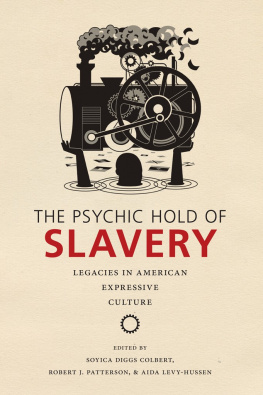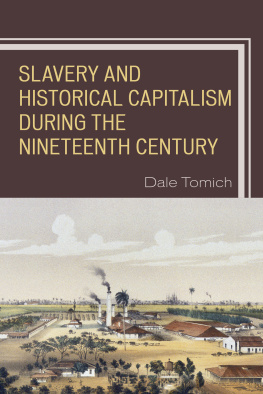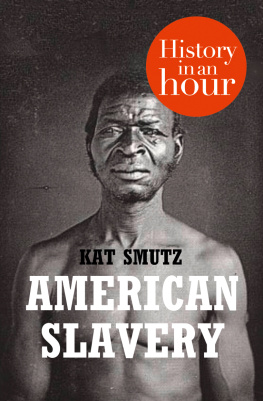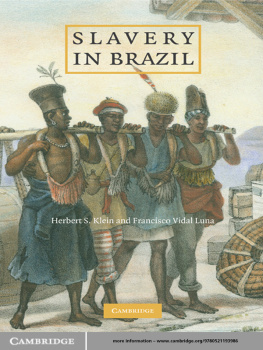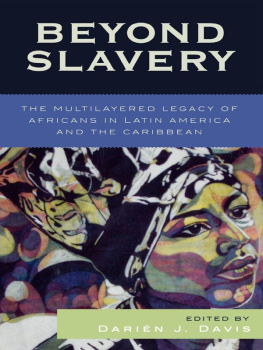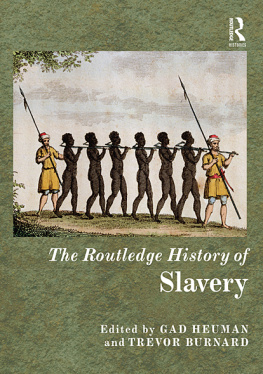The Psychic Hold of Slavery
The Psychic Hold of Slavery
Legacies in American Expressive Culture
EDITED BY
SOYICA DIGGS COLBERT ROBERT J. PATTERSON AND AIDA LEVY-HUSSEN
RUTGERS UNIVERSITY PRESS
NEW BRUNSWICK, NEW JERSEY, AND LONDON
LIBRARY OF CONGRESS CATALOGING-IN-PUBLICATION DATA
Names: Colbert, Soyica Diggs, 1979 editor. | Patterson, Robert J., editor. | Levy-Hussen, Aida, 1981 editor.
Title: The psychic hold of slavery : legacies in American expressive culture / edited by Soyica Diggs Colbert, Robert J. Patterson, and Aida Levy-Hussen.
Description: New Brunswick, NJ : Rutgers University Press, 2016. | Includes bibliographical references and index.
Identifiers: LCCN 2015041072 (print) | LCCN 2015048371 (ebook) | ISBN 9780813583969 (hardback) | ISBN 9780813583952 (pbk.) | ISBN 9780813583976 (e-book (ePub)) | ISBN 9780813583983 (e-book (Web PDF))
Subjects: LCSH: African AmericansStudy and teachingUnited States. | American literatureAfrican American authorsHistory and criticism. | African Americans in literature. | BISAC: SOCIAL SCIENCE / Slavery. | LITERARY CRITICISM / American / African American. | PSYCHOLOGY / Social Psychology. | SOCIAL SCIENCE / Black Studies (Global). | HISTORY / United States / Civil War Period (18501877).
Classification: LCC E184.7 .P79 2016 (print) | LCC E184.7 (ebook) | DDC 810.9/896073dc23
LC record available at http://lccn.loc.gov/2015041072
A British Cataloging-in-Publication record for this book is available from the British Library.
Excerpts from the new black 2011 by Evie Shockley. Reprinted with permission of Wesleyan University Press.
This collection copyright 2016 by Rutgers, The State University Individual chapters copyright 2016 in the names of their authors
All rights reserved
No part of this book may be reproduced or utilized in any form or by any means, electronic or mechanical, or by any information storage and retrieval system, without written permission from the publisher. Please contact Rutgers University Press, 106 Somerset Street, New Brunswick, NJ 08901. The only exception to this prohibition is fair use as defined by U.S. copyright law.
Visit our website: http://rutgerspress.rutgers.edu
Manufactured in the United States of America
Soyica Diggs Colbert
to Rodger
Robert J. Patterson
to the Spirit
CONTENTS
SOYICA DIGGS COLBERT
ROBERT J. PATTERSON
DOUGLAS A. JONES JR.
CALVIN WARREN
MARGO NATALIE CRAWFORD
RGINE MICHELLE JEAN-CHARLES
GERSHUN AVILEZ
SOYICA DIGGS COLBERT
BRANDON J. MANNING
MICHAEL CHANEY
AIDA LEVY-HUSSEN
ROBERT J. PATTERSON
What ultimately has become The Psychic Hold of Slavery: Legacies in American Expressive Culture began as a conversation between Soyica Diggs Colbert and her former colleague Donald Pease. In the spring of 2013, after the November 2011 publication of The African American Theatrical Body: Reception, Performance, and the Stage, the Leslie Center for the Humanities Psychoanalysis Study Group at Dartmouth College invited Colbert to present some of her research on how racial melancholia and mourning function in James Baldwins Blues for Mister Charlie. Following the presentation, Colbert explained that her current research project, Black Movements: Performance and Politics, was less focused on the psychic dynamics of race and racism. Pease encouraged her to continue to consider how psychoanalysis animates racial dynamics. So, after some thought, Colbert invited Robert J. Patterson and Aida Levy-Hussen to collaborate on the project that became this book.
Pattersons Exodus Politics: Civil Rights and Leadership in African American Literature and Culture was published in the fall of 2013. It challenges a growing trend in African American studies of situating current political striving in a postcivil rights context. Pattersons book delineates the paradoxical aims of the civil rights movement, not only to demonstrate what limited artists and activists from achieving their aims during the classic phase of the movement but also to reveal how African American literature written in the late twentieth century offers a future for the freedom dreams conjured in the 1950s and 1960s.
Given Pattersons interest in black cultural production after the classical phase of the civil rights movement, he and Colbert discussed curating a volume that would examine the spate of late twentieth- and early twenty-first century cultural productions about slavery. Aware that Aida Levy-Hussen was in the midst of drafting How to Read African American Literature: PostCivil Rights Fiction and the Task of Interpretation, a forthcoming monograph that draws on psychoanalytic theory to account for African American literatures historical turn and its implications for hermeneutics, they asked her to join them as an editor of their proposed volume.
The editors are grateful for the support and assistance of many people and institutions. They thank New York University Press for permission to reprint , Trauma and the Historical Turn in Black Literary Discourse, which is a modified version of a chapter in Levy-Hussens forthcoming monograph. In addition, the generosity of Chester Gillis, dean of Georgetown College, and G. William Rebeck, former interim dean of Georgetown Universitys Graduate School of Arts and Sciences, gave all three editors the opportunity to convene a symposium for workshopping papers that responded to the question What desires, investments, or identitarian logics account for our inabilityor unwillingnessto get over slavery? The purpose of this symposium was to foster dialogue and generate cohesive chapters engaging a question that currently lies at the heart of cross-disciplinary African Americanist study. The symposium enabled the contributors to begin a discussion that eventually informed the volume as a whole.
The editors would not have been able to carve out either the time or the psychic, emotional, and physical space to edit this volume without the support of family, friends, and colleagues. They thank the contributors for their willingness to participate in a true collaboration; Leslie Mitchner, their acquisitions editor at Rutgers University Press, for her careful stewardship of the volume through each stage of its development; and the reviewers for their helpful feedback, which guided the revision process. They also would like to thank the individuals who read portions of the manuscript before publication. Thank you to Michael Awkward, Erica Edwards, and Meta DuEwa Jones for useful comments and clear feedback. Finally, thank you to Linda Blair for compiling the bibliography.
The Psychic Hold of Slavery
SOYICA DIGGS COLBERT
Do you want to be well? A question, seemingly so simple, only warrants an affirmative response. But what is wellness, and how do the social conditions that constitute the subject inform the individuals ability to be well? In a world of shifting power relations (according to Michel Foucault), how does the individuals decision to be well relate to the complex context of making decisions in general? And if all decisions are made within the context of the subjects relative and ever-changing relationship to power, then, as the chapters that follow suggest, wellness is a temporally bound state that requires examination of the relationship between trauma of the past and domination in the present.
This book builds on James Baldwins depiction in

